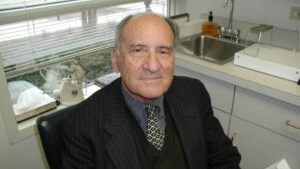In Loving Memory of Dr. Karl E. Ticho (1926-2020)
&srotate=0)
I am very grateful for the many expressions of sympathy received since my father’s passing the day before Thanksgiving. He founded his ophthalmology practice in 1957, and worked in Oak Lawn and then Chicago Ridge for close to 60 years.
He was a soft-spoken man, who did not often explicitly explain his preferences, give direction, or verbalize affection. But he led by example.
He was an avid reader and made great efforts to stay up-to-date on innovations in ophthalmology. For decades he attended Wednesday Grand Rounds at the University of Illinois Eye & Ear Infirmary, back when this featured live examinations of patients. I believe he didn’t miss an American Academy of Ophthalmology meeting for forty years. He particularly favored courses in Neuro-ophthalmology, reflecting his belief that the brain was a “black box” which warranted more exploration than any other endeavor.
My father was fortunate to have brought in Dr. Leonard Kut as a partner after the latter’s medical tour in Vietnam. The two shared an integrity which is seemingly rare in modern business. Dr. Kut served as the Eye & Ear Infirmary’s ocular ultrasonographer, with a specialty clinic wherein he delineated structural changes which couldn’t be found with regular eye examination techniques. The two of them were generous with generations of ophthalmology residents in clinical and surgical instruction.
I was no exception, learning the basics of cataract surgery from both of them. Certainly, that operation has come a long way over the past 60 years. Remarkably, when I joined my father’s practice, his first request was that I teach him whatever I could about the latest cataract surgical techniques.
Truthfully, I was initially a little apprehensive. The first hurdle he would face, I told him, was to learn how to operate inside the eye using his left hand. Previous surgical approaches had utilized only one hand – the dominant right hand – in order to extract the cataract lens in a single piece. The newer operation would require his left hand to assist the right in “chopping” the lens into pieces inside the eye.
Then around 60 years old, my father had not used his left hand for intraocular surgery. I asked, Did he really want to try something so different at this point in his career? He insisted, having seen the superior results from the new techniques. Remarkably (and to my great relief), he mastered the two-handed approach and continued to be an excellent cataract surgeon for over another decade.
He had great surgical hands. That genetic heritage continues to give me encouragement. But the ability to learn new tricks late in the game is even more heartening to me. Even in the last decade of his career, when he had literally seen almost everything, some variation of even commonplace pathology would fascinate him.
I’m sure many children have a challenging time working alongside a parent. But for me, the experience was a great joy. Many times, when seeing a patient with a difficult or interesting finding, I’d say, “Let’s go see the Master.” And we’d head over to his exam room for a second opinion. Even when he didn’t know the answer, or maybe especially then, Karl would approach the patient with empathy, humility and curiosity.
He taught me that giving a good pair of glasses was as valuable for many patients as doing an operation. He was sensitive to their anxieties, once counseling me, “Don’t call it a tumor — too scary — call it a ‘growth’.” And, perhaps because of his upbringing, he had an amazing reluctance to spend his patients’ money, often talking them out of getting new frames.
This simple approach as a patient advocate served him well, earning the affection of so many South Siders. It remains a great source of pleasure for me to hear someone say, “Your father fixed my grandmother’s glaucoma” or “He took a piece of steel out of my eye 30 years ago”.
While thankful that my father passed peacefully in his sleep without any apparent preceding illness or suffering, my family, like so many others, was unable to visit with him over the previous 9 months, due to pandemic-related restrictions. Like so many of his generation, he really never complained, and he put up with the difficulties and indignities of COVID-19 as well as advanced age with a cheerful and stoic attitude. That was his last lesson by example for me.
Benjamin H Ticho, MD